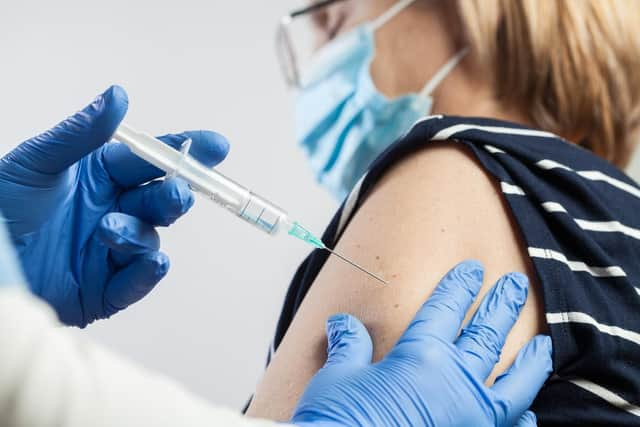AstraZeneca second dose: should I get jab despite rare blood clot link - and can it be from different vaccine?
and live on Freeview channel 276
Health officials are seeking to maintain public confidence in the AstraZeneca Covid-19 vaccine amid concerns it could be linked to potentially deadly blood clots.
A total of 79 people have reported blood clots in the UK after receiving their first vaccine dose, but the Medicines and Healthcare products Regulatory Agency (MHRA) has not yet concluded if the vaccine is causing the rare brain clots.
Advertisement
Hide AdAdvertisement
Hide AdThe MHRA noted that the link between the vaccine and the rare blood clots was getting stronger, but added the risk of dying after having the jab is a one in a million chance.


Health Secretary Matt Hancock has said that everyone should take a coronavirus vaccine when their time comes, and stressed that the risk of experiencing a brain clot was the same as “taking a long-haul flight”.
However, while investigations into the cause of the blood clots continue, young adults under the age of 30 will now be offered an alternative to the AstraZeneca vaccine.
But what is the advice for those who have already had their first dose? Here’s what you need to know.
Which vaccine will under 30s get?
Advertisement
Hide AdAdvertisement
Hide AdYoung adults between the age of 18 and 29 will be offered the Pfizer or Moderna vaccine, or another Covid-19 jab that becomes available on the UK’s vaccination programme.
The decision to stop administering the AstraZeneca vaccine to this age group comes after the MHRA said the balance of risk for the jab is very favourable for older people, but is “more finely balanced” among younger groups, who do not tend to suffer serious illness from coronavirus.
The Joint Committee on Vaccination and Immunisation (JCVI) said the recommendation to give a different vaccine to AstraZeneca for the under-30s was “out of the utmost caution”, rather than because of “any serious safety concerns”.
Professor Sir Munir Pirmohamed, chairman of the Commission on Human Medicines, added that any risks from the vaccine had to be set against the fact around 30 per cent of people with Covid suffer low blood platelet counts, while the virus also “causes clotting”.
Advertisement
Hide AdAdvertisement
Hide AdSome 7.8 per cent of people with Covid suffer blood clots on the lungs, while 11.2 per cent will suffer deep vein thrombosis (DVT).
He said there appears to be a “slightly higher risk in the younger age group” of clots after the AstraZeneca vaccine, but the reason is “not clear” with further work required.
What if I’ve already had my first dose?
The MHRA has said that people who have already had their first dose of the AstraZeneca vaccine should still get their second dose.
People who are at higher risk of blood clots because of their medical condition should only be considered for the AstraZeneca vaccine if the benefits from the protection against Covid-19 outweighs the potential risks.
Advertisement
Hide AdAdvertisement
Hide AdAnyone who experienced cerebral or other major blood clots occurring with low levels of platelets after their first vaccine AstraZeneca dose should not have their second jab.
Women who are pregnant should discuss with their healthcare professional whether the benefits of having the vaccine outweigh the risks for them.
While investigations continue, the MHRA is advising as a precautionary measure that anyone who experiences symptoms four days or more after vaccination should seek medical advice.
These symptoms may include:
- a new onset of severe or persistent headache, blurred vision, confusion or seizures
Advertisement
Hide AdAdvertisement
Hide Ad- develop shortness of breath, chest pain, leg swelling or persistent abdominal pain,
- unusual skin bruising or pinpoint round spots beyond the injection site
Anyone who did not experience any of the above side effects should come forward for their second dose when invited.
Can I get my second dose from a different vaccine?
The official Joint Committee on Vaccination and Immunisation (JCVI) guidance outlines that everyone getting inoculated should receive the same vaccine for both doses.
Advertisement
Hide AdAdvertisement
Hide AdThat means if you receive the Pfizer vaccine the first time, you should be given that jab again at your second appointment.
The guidance states: “JCVI advises that the second vaccine dose should be with the same vaccine as for the first dose.
“Switching between vaccines or missing the second dose is not advised as this may affect the duration of protection.”
A UK trial was launched in February by Oxford University to see if giving people different vaccines for their first and second doses works as well, or better than, the current approach of using the same type of vaccine.
Advertisement
Hide AdAdvertisement
Hide AdHowever, head of immunisations at PHE, Dr Mary Ramsey, said that “every effort should be made” to give people the same vaccine before mixing is considered.
The suggestion of mixing different vaccines has been strongly criticised by the US Centers for Disease Control and Prevention, which said the approved vaccines “are not interchangeable” because the safety and efficacy of mixing jabs has not yet been determined.